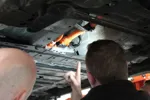Such was the risk that Kia felt in what it calls “lack of consistency” in customer service that it opened a training centre near Nottingham last year.
With four workshops, seven training rooms and a replica showroom, the 17,500sq ft facility is a clear demonstration that Kia has a problem that it is determinted to fix.
The bricks and mortar is only one element of a seven-figure annual investment in training that Kia plans to use to instil a “family-like care” in its network.
E-learning – an acknowledgement of the importance of the Playstation generation in the management teams of the future – is as much a key part of the training goals as the classroom.
Around 6,000 e-learning modules will be undertaken by staff in the training programme.
“Too often the best salesmen become sales managers without enough training or without enough coaching in what it takes to become a manager of a big business and of people,” Philpott said.
“And Kia’s success has helped make these sizeable-turnover businesses, no longer selling 150 cars a year but an average of 350.”
So Kia is now investing in three-year coaching programmes to enhance the capability of dealership management and, as much about consistent customer care, is the way they run and create a culture in the dealership that drives greater staff loyalty.
The training programme
The in-dealer programme is called DNA.
The name comes from the aspiration to develop a culture for coaching, engage all staff on the company’s values and apply best practice.
A team of six, which includes IMI accreditation, plans to work with dealer senior managers in four waves to programme completion in August 2014.
The process
A capability evaluation is the first step, based on a ‘climate’ survey to understand the beliefs, behaviours and culture in the dealership.
All staff can complete the survey of 21 questions and statements designed to measure their engagement and morale.
This is followed up with a personal profile analysis (PPA) and emotional intelligence (EI) assessment on all line managers and customer-facing staff.
A coach then works with the department manager to develop managers’ skills, competencies and the behaviour needed to effectively manage their team.
CSI scores and rankings are reviewed, together with mystery shopping results with a coach.
The training is not just about the individual.
The environment they are working in is also judged.
An online element comes into play in the form of the ‘DNA portal’, a best practice planning tool allowing managers to measure processes against Kia’s ’10-step process’, one for sales, another for service.
The portal is also a toolkit of DNA programme material and is a reporting suite to track performance locally and nationally.
Dealer staff are also introduced to the ‘Kia behaviours’: be inspiring, engaging, interested and exceptional.
“We believe that a true ‘family-like’ care experience is built on more than just the sales and service processes,” said Stephen Dorman, Kia customer experience manager.
“We also need to demonstrate certain key behaviours, delivered with the right attitude and enthusiasm.”
To the end of 2012, the DNA programme coaches had worked with around 90 dealers and 700 staff through personal visits, online sessions and podcasts.
Line managers have also been giving one-to-one coaching to staff.
Programme results
Measured over 12 months, churn of staff at dealerships that have been on the DNA programme has fallen from 16% to 11% compared to the previous 12 months.
The national average is 25%.
Over the same time, customer satisfaction ratings were up as much as 15.7%.
Dealer group management have also backed the scheme.
“Within a very short time I could see the benefits to the business in terms of team morale, the customer experience and, probably just as important, if not more so, is the improvement on the bottom line,” said Martin Camplin, managing director, Grovebury Cars.
And Terry O’Neill, Benfield Motor Group’s general manager, said: “What has been a real success is the different way we have approached our weak areas and the solid action plans that have been put in place.
"Together they are beginning to have a positive impact.”
Kia has not measured the direct return on investment in the training.
Philpott said: “DNA is working.
"We are seeing customer satisfaction and customer recommendations increase.”
Kia was also the first manufacturer to employ and embed a third-party customer feedback tool into its websites.
Reevoo was employed to help Kia stand out and acknowledge that customers were commenting on social
networking sites already.
“Our warranty was unique, but we wanted something more to sit alongside that, setting Kia apart further,” Philpott said.
“People are going to write about and review our products on social media sites anyway, so why don’t we just put it on our own websites?
"We’ve now got more than 4,000 customer reviews – good and bad – on our website today.
"Our average score is 8.9 out of 10.”
The next step was to allow scoring on dealer websites.
Their average score is around nine out of 10; 40% of dealers have full marks.
And Philpott believes there is a correlation between the DNA programme and the improvement in Reevoo scores.



















Login to comment
Comments
No comments have been made yet.